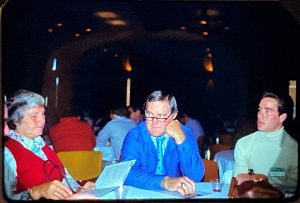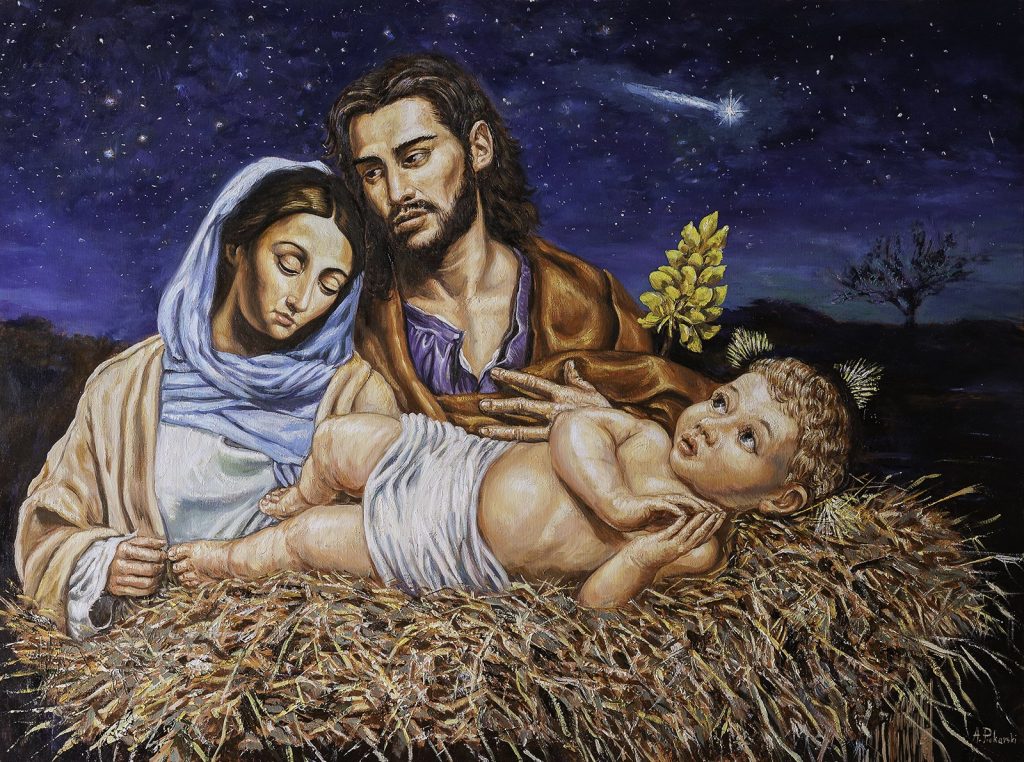My father died suddenly on Christmas Eve morning when he was 49 years old, leaving my mother a widow with seven children. The struggle I faced that Christmas, so I came to realize, was no different from the one that afflicts everyone every day: loss and longing.
My challenge was to pay special attention to Christmas — seeing past the superficial — to get to the mystery’s real meaning. Can Christmas offer an answer to keenly felt sorrow and pain? I have never forgotten consoling words I discovered years later from poet Rainer Maria Rilke to a hurting friend: “Celebrate Christmas in this devout feeling that perhaps God needs this very anguish of yours in order to begin.” And who of us these days is not feeling intense anguish?
The unexpected absence of my father made me yearn for something non-negotiable: a Presence to fill the void. The Son of God coming in the flesh — Emmanuel, God-With-Us — is that Presence. And only a Presence is adequate for answering the emptiness and need that the human being is. Why? Because a Presence is the beginning of the end of barriers in our life. Presence “is to know that there are experiences that lessen the dread of separation, loneliness, and even death,” wrote author Ralph Harper.
An insight of Cardinal Joseph Ratzinger seems to me positively prophetic: “In what does the human being’s wretchedness actually consist? The root of the human being’s wretchedness is loneliness, is the absence of love — is the fact that my existence is not embraced by a love that makes it necessary.” Christmas is the birth of that Love.
Which is why, even now from the manger, Jesus is turning the tenderness of his Sacred Heart to the hemorrhaging woman who soon will stretch out her hand to Christ’s hem for a cure. Even now without words he is saying to her — and to us — “Daughter, your faith has saved you.” Even now he beckons the lame man in Bethesda: “Do you want to be healed?” Even now he sets out to find the leper and everyone who faces their affliction with trust-filled hope: “If you will to do so, you can make me clean!”

We need the celebration of Christmas to happen every year in order to stanch our forgetfulness of God that otherwise takes over. Christmas proclaims that we are made by God and for God, and that we cannot live without him. For “without God man neither knows which way to go, nor even understands who he is,” wrote Pope Benedict XVI in his encyclical “Caritas in Veritate” (“Charity in Truth,” No. 78). “The human being’s alienation from God has so buried in oblivion so many of the human being’s aspects,” warned Father Hans Urs von Balthasar, “that these can be brought up again only through God’s Incarnation.”
We long for a human touch, a human gaze to lead us back to God. The playwright Paul Claudel, who himself experienced a grace of reconversion on Christmas Eve, observed, “God, being unable to make himself known, contrived to make himself born.”
St. Bernard counseled: “God’s Son came in the flesh so that mortal human beings could see and recognize God’s kindness.” Accordingly, “all the holiness God has destined for our souls has been placed in the humanity of Christ, and it is from this source that we must draw,” wrote Blessed Columba Marmion.
To woo us back to our own humanity, Jesus comes to us — not in magnificence and splendor — but as a baby. St. Bernard spelled out the stunning logic of the Incarnation: “The lesser Jesus became through his human nature, the greater was his goodness; the more he lowered himself for me, the dearer he is to me. Jesus comes as a little one lest we be terrified.”
The whole of Christ’s intention at Christmas is to share his life with us. “Christ did not live his life for himself but for us. ... Christ enables us to live in him all that he himself lived, and he lives it in us (CCC 519, 521).
Many years ago, a priest friend served as a missionary in Mongolia. The people had never been introduced to Christianity and had not heard of Jesus Christ. Being nomads, they opt not for stationary houses, but for big tents called yurts or gers that can be readily pitched and dismantled.
At the Christmas Mass my friend celebrated in that country, what could he say to the Mongolians so that they could encounter Jesus Christ? He proclaimed the Gospel: “The Word became flesh and pitched his tent among us” (John 1:14). The people’s jaws dropped. They exclaimed to the priest in amazement: “God wants to be with us and he is just like us!”
Our family custom on Christmas Eve was to open one gift. Returning home from the Christmas Vigil Mass, my brothers and sisters and I gathered, feeling awkward, wondering what we would do. Wouldn’t opening presents be disrespectful? But my mother assured us that opening gifts is what my father would have wanted. My mother never read the 20th-century Scandinavian writer and Catholic convert Sigrid Unset, but she certainly possessed her wisdom:
“When we give each other Christmas gifts in Jesus’ Name, let us remember that he has given us the sun and the moon and the stars, and the earth with its forests and mountains and oceans — and all that lives and moves upon them. And to save us from our own foolishness, from all our sins, he came down to earth and gave us himself.”

